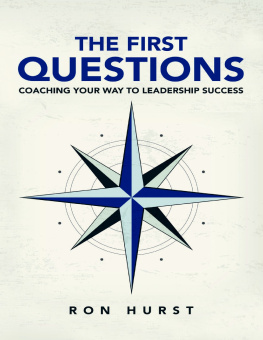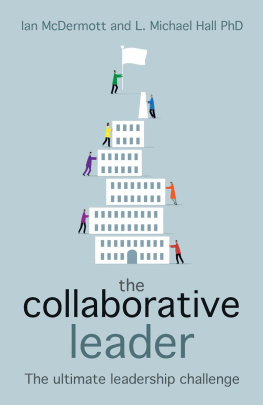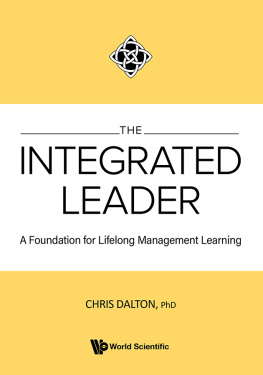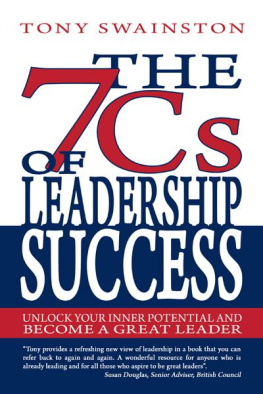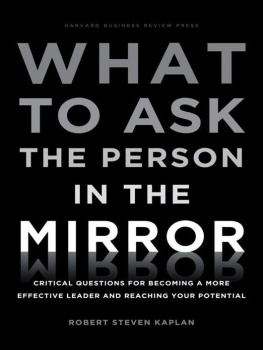THE FIRST QUESTIONS
COACHING YOUR WAY TO LEADERSHIP SUCCESS
RON HURST
Copyright 2014 Ron Hurst.
All rights reserved. No part of this book may be reproduced, stored, or transmitted by any meanswhether auditory, graphic, mechanical, or electronicwithout written permission of both publisher and author, except in the case of brief excerpts used in critical articles and reviews. Unauthorized reproduction of any part of this work is illegal and is punishable by law.
ISBN: 978-1-4834-1203-0 (sc)
ISBN: 978-1-4834-1202-3 (e)
Library of Congress Control Number: 2014908349
Because of the dynamic nature of the Internet, any web addresses or links contained in this book may have changed since publication and may no longer be valid. The views expressed in this work are solely those of the author and do not necessarily reflect the views of the publisher, and the publisher hereby disclaims any responsibility for them.
Any people depicted in stock imagery provided by Thinkstock are models, and such images are being used for illustrative purposes only.
Certain stock imagery Thinkstock.
Lulu Publishing Services rev. date: 5/8/2014
Contents
Dedicated to my mom, Cecelia E. Hurst, who valiantly fought cancer for more than eleven years. You are the bravest person and leader I was blessed to know and love. Now that the fight is over, I wish you peace and rest in the arms of your Sa vior.
We will meet a gain.
Acknowledgments
You never really write a book alone, and this effort is no different. I am indebted to my wife, Kim, and children Mitch and Meg for putting up with the process. Thank you to Daryn Schiveley, who helped draw out of me the material for the last chapters and transcribe many pages of notes. Thanks also to Kristel Faye Soriano, who helped with the first several chapters. There are many stories embedded in this book, and these come from so many wonderful people I have met along the way. There are too many to name, but thank you to all. You made my journey richer and this book deeper and more powe rful.
Special thanks to Lulu Publishing for helping me complete this pro ject.
Early in my career I was drawn to observe how others led. I did not like what I saw. Most of the people in management positions with the authority to lead really did not appear to know what it meant to lead. It wasnt so much that they were negligent or reckless; rather, it appeared they simply didnt know a better way. I saw too many cases where people were hurt by managers doing what the managers thought was the right thing but were doing it in the wrong way. Never one to criticize without the willingness of a person attempting to do better, I set about the task of becoming a competent leader. Throughout my career I took on and mastered levels of management in different contexts. Whether I was an engineer, supervisor, technical sales manager, quality manager, an operations manager, a plant manager, or president, I have committed to a journey of learning along the way.
Several years, positions, and degrees later, I found myself studying for what I knew would ultimately be the answer to a career-defining question: How can I help people lead be tter?
I was attending Fielding Graduate School, studying in their evidence-based coaching program. The answer to this question was to weave a healthy dose of coaching questions into experiential training programs, essentially transforming the process into group leadership coaching. The mix of one-on-one coaching and group coaching led to this book and to the success my company has enjoyed in Southern Califo rnia.
Since graduating Fielding, I founded the company Developing Leaders Inc. and now help thousands of people in Southern California and beyond to become great leaders. We offer training/group coaching programs to help aspiring and existing managers increase their leadership compet ence.
This is a book designed to help you grow your leadership ability. Each chapter will lead you through a series of topics related to your own skills. It will help you discover who you are and how to leverage your strengths. The format is a series of questions related to key topics that I have found critical to my coaching clients. In many areas, you can complete exercises to further your learning and gr owth.
Each chapter will explore a different aspect of your growth as a leader. Chapter 1, Personal Mastery, focuses on you, looking deeply at who you are and your worldview. How does your self-perception hold you back or facilitate your success? With knowledge of self we can begin to interact with the world in a purposeful and wise manner. It is here we begin to discover our purpose and begin to walk in it. Chapter 2, Purpose Mastery, follows with an exploration of what you want to accomplish as a le ader.
Chapter 3 looks at Change Mastery. I cannot tell you how often this area is mishandled by people in leadership roles. The ability to lead people through change is difficult, yes, but so necessary. It is built upon a foundation of trust and authentic relationship. Chapter 4 continues with an exploration of Interpersonal Mastery, or how you interact with the world around you.
Chapter 5 is about action. How do you act in an appropriate and sustainable way? Leadership requires action. In the absence of action, a leader is nothing but a dreamer or thinker. Chapter 6, Motivation Mastery, is an exploration of how you motivate yourself to ach ieve.
Whether you have a belief in an Almighty God or perhaps hold a different set of spiritual beliefs, the concept of faith cannot be ignored. Recognize that many of your followers want to believe in something, to have hope in a cause bigger than themselves. The final chapter, Faith Mastery, is really a way of bringing all these concepts together and closing out with the realization that leaders are dealers in hope (Napoleon Bonap arte).
How Is This Book Desi gned?
This is a straightforward book, a coaching book. It is set up to ask you the first question in a line of thinking to help you discover your leadership abilities. Its what you would get if you were sitting face to face with me in a live coaching session. These are my starting quest ions.
Of course they are, as the title suggests, the first questions in a number of different topic areas. If you follow the threads and answer each question honestly, you will learn much about your self.
I have to be honest with you. There is no second question without some level of interaction. Certainly you could come up with your own second questions, and I encourage you to do so. You can learn much through the reflective/active process of professional leadership coac hing.
Why Should You Read This Book?
Perhaps you heard of the Peter Principle. Originally identified by Dr. Laurence J. Peter in 1969, it relates the idea that people are continually promoted until they reach their level of incompetence. This concept, while sarcastic and bitter in tone, is truer than most of us care to admit. Consider the talented work associate who is promoted to team lead or the hard-driving engineer who becomes manager. They were productive and great in their previous positions, but what does their productivity have to do with leading a g roup?
Unfortunately, there is little correlation between technical abilities to perform tasks well and the ability to lead a group. There are specific skills that will help you be an effective leader, and this book is designed to help you find and then practice them. I dont want you to become a victim of the Peter Principle. You can learn to lead, starting now.
How Do Organizations Determine Who Will Get Promoted into Leadership/Management Posit ions?
Often they choose people who are confident and competent in their current role. What does their current role have to do with leadership? Often not much: unfortunately, well-meaning managers mistake confidence and task competence for overall confidence and competence. They must reason that a resourceful and capable employee will be able to figure out the leadership role. Many a promising career has been derailed over this simplistic assumption. In my career I have too often seen a talented employee who was promoted, failed in the new role, and was fired or demoted. What a tragedy! This should not happen. Do not let this happen to you. If you learn to navigate the skill set a leader needs, you will greatly improve your probability of suc cess.
Next page
